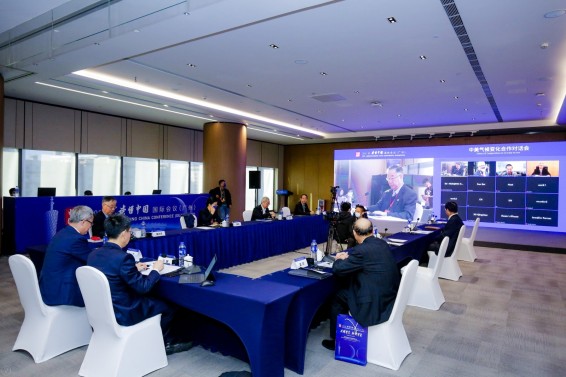Climate change can be new bright spot for Sino-US cooperation: experts

Photo taken on Dec.2, 2021 shows the Sino-US Dialogue on Cooperation in Climate Change during the 2021 Understanding China Conference (Guangzhou), in Guangzhou, south China's Guangdong Province. (Photo provided to People's Daily Online)
The Sino-US Dialogue on Cooperation in Climate Change was held on December 2nd on the sidelines of the 2021 Understanding China Conference to address the climate crisis and deepen multilateral cooperation. Participants from home and abroad held in-depth discussions on global climate governance and Sino-US cooperation after COP26.
"Climate change is a global challenge, and no country or region can deal with it alone," said Qin Dahe, a member of the Chinese Academy of Sciences. "The joint declaration issued by China and the U.S. on enhancing climate action stands as a confidence booster for all parties in fighting climate change and also as an impetus for improving global climate governance amid daunting challenges."
Xu Huaqing, the Deputy Director-General of the National Center for Climate Change Strategy and International Cooperation (NCSC), noted that climate change could become a new bright spot for Sino-US cooperation as the two countries go full speed ahead in their transition to the green economy.
"To effectively address the climate crisis, the two countries should take advantage of existing dialogue channels and mechanism platforms to take enhanced actions and solve specific climate problems," said Xu, noting that the two sides would accelerate the establishment of the Working Group on Enhancing Climate Action in 2020s, which is included in the joint declaration.
Xu also called for concrete climate actions to be enhanced in this decade. "China and U.S. should carry out policy and technical exchanges, as well as identification of programs and projects in areas of mutual interest. According to their different national circumstances, the two countries should work jointly with other countries to accelerate green and low-carbon transition and innovation of climate technology."
Alex Wang, a professor at UCLA School of Law and Faculty Co-Director of the Emmett Institute, pointed out that while the Sino-US joint declaration has sent out a positive signal in the fight against climate change, actions are still needed.
According to Alex, countries must honor their commitments and set realistic plans to deliver their climate action measures. Given the inconsistency of U.S. climate policy, he called on the country to set up a mechanism to ensure transparency of climate action and support.
China aims to peak its CO2 emissions before 2030 and achieve carbon neutrality before 2060. To meet these goals, the country has formulated and released a top-level design document for peaking carbon emissions and achieving carbon neutrality and an action plan.
Alex suggested that China could share its actions and experiences on addressing climate issues to the world, as the country is spearheading low-carbon development, especially in the renewable energy sector.
Photos
Related Stories
- China's foreign ministry releases report on state of democracy in U.S.
- Cold War offers lessons for managing U.S.-China tensions, scholars argue
- China shows commitment to climate action with coal plants pledge: experts
- U.S. attempts to curb China's sci-tech innovation exposes hegemony mindset
- Feature: "My decision to stay in China leads to truly unique life"
- Biden's China strategy stirs concern at home and abroad: Business Insider
Copyright © 2021 People's Daily Online. All Rights Reserved.










